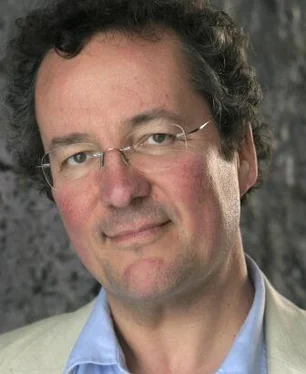The mark pointed towards a narrow alley which headed up away from the Cathedral. Simon was about to take the men up that way, when he saw what looked like another print – except this one pointed to a barn door. The door looked slightly ajar, and Simon, looking up, thought he saw a flash, as though there was an eye in the gap, watching to see what the posse would do.
Simon looked along the alley again and nodded to himself. He stood, whistled, and, when he had the attention of all the men, he ran straight at the barn’s door, kicking at it with a foot.
Domingo saw Simon slump to the ground in defeat, and smiled to himself, but he wanted these men to leave. He didn’t want them idling away their time here, he wanted them to run off in a different direction. There was a group of three who were pointing away from the Cathedral, and he willed the others to take their advice. ‘Go on, go on!’
The whistle cut through his thoughts. It was as loud as a pig’s squeal and Domingo’s attention shot back to Simon. He saw the Bailiff look about him with satisfaction at all the other men, then he saw Simon’s gaze turn back towards him and the door, and realised. ‘No!’
He retreated as Simon began to run. In moments the door shivered to pieces and the whole barn filled with particles of rotten wood and dust. By then he was already partway to a screen at the back of the barn. He hoped that there was a room beyond, maybe with an exit to another building, thence to an alley where he could escape, but as he ran in, he realised that this was only a garderobe. His feet took him almost into the small chamber, and then he had to stop, before he got trapped.
Turning at bay, he felt his lips draw back from his teeth in a snarl of animal rage. He shouldn’t be in this position! He shouldn’t! Grabbing at his purse, he pulled out the relic, and muttered a prayer for protection to Saint Peter, but there was nothing; no reply. He grasped the box in his fist, shaking it furiously. The Saint could save him if he wanted, but he had no regard for Domingo, and the outlaw knew that even that last hope was gone. He uttered a curse against the Saint, his parents, and all his descendants just as the door cracked and fell, and Simon hurtled in.
It was all the Bailiff could do to duck under the swinging knife; he felt no more than a slight grabbing at his shoulder as the knife caught at his jack. Luckily the quilting saved him from being scratched. Domingo couldn’t escape, for the door was blocked with the other men from the pursuit, so he turned again to face Simon. If he couldn’t get out, he could sure as hell take the foreigner hostage, keep him at knife-point until they paid him and released him.
Simon was feeling quite faint now – and that was his excuse later. He should have been able to disarm the Galician without killing him, but at the moment, all he could think of was that knife and stopping it from hurting him. His reactions were too slow; he still felt queasy after all the running, on top of his earlier fainting fit. As Domingo charged towards him again, he lifted his sword.
Domingo felt the steel slip into his breast with a sense of disbelief. There was no pain, just a curious slithering sensation, but when he looked down, he saw that the sword was buried in his chest. He opened his mouth, tottered, and then lifted his knife to dash Simon to the floor, pushing himself onwards, using the full force of his weight and malice to try to crush Simon.
All Simon could see was the insanely grinning features of Domingo advancing. It was a scene from hell, with the mad face approaching and the wet red knife held wickedly high overhead. Simon felt himself being pushed back, until there was nothing but the timbers of the garderobe behind him and beneath him; and then he heard a great cracking and wrenching, and felt himself freefall, that smiling face above him like a devil’s, pulling him down to hell.
‘How is he?’ Baldwin demanded as soon as Munio returned.
‘Not good. I think it is the heat. It can sometimes affect a man who is not used to our weather, yes? He was very exhausted.’
‘Exhausted!’ Baldwin repeated. All he could remember was that foul stench.
They were in Munio’s house, a long, low building with a garden that was planted with more plants than Baldwin could possibly name. The whole place seemed verdant, and filled with vibrant colours – rich purples, reds, yellows and everywhere green.
The house itself was white-painted with simple shutters on each window and a small stable for Munio’s two horses, to whom Baldwin had already introduced himself. The knight always liked to investigate the horseflesh wherever he went, but it was scarcely worth the bother in Munio’s household, he saw. One plain and rather old rounsey and a skittish young mare made up the total complement. Munio was not poor, but neither was he wealthy.
When Simon had set off after the felon, Baldwin had been helping to disarm one of Domingo’s men, and had not noticed his friend’s sudden disappearance. Later, when he and Munio wondered why Simon had not come to help interrogate the members of the band, Baldwin was only just in time to hear of the accident, and then he had bolted after the messenger to go and supervise Simon’s rescue.
It had been one of the most repulsive tasks Baldwin had ever witnessed. The two men had fallen through the floor of the garderobe, toppling together some fifteen feet into the relative softness of the heaped sewage underneath. It was fortunate that the toilet did not fall straight into a stream, as so many did, for then Simon must surely have drowned. As it was, he fell backwards into the muck, Domingo on top of him, embedding Simon’s sword deep within his torso. The robber was already dead when Baldwin arrived; the knight had thought Simon was as well.
It was a terrible shock. Baldwin had known many comrades die, and he would have said, had he been asked, that he was all but inured to loss. True, he would not have felt that way about his wife, nor his daughter, but he would have thought that losing the companionship of a man was something he had been long seasoned against fearing. The idea that a man’s death could bring him up so sharply had not occurred to him. Yet here it was. His hand grasped his sword hilt as though to keep his grip on reality, but all he could see was the terrible future, of returning to England without his best friend, of telling Simon’s wife and family that he was dead. He could imagine all too easily the appalled horror in Meg’s eyes.
He wanted to fall to his knees and beg for his life, to demand that God return him, to say that God had made an error, and that Simon should recover; he wanted to deny what he knew had happened. His best friend was dead.
Yes, he felt the odd emptiness in his throat, the heat at his eyeballs, the utter despair that hammered over his soul. Simon had been his first acquaintance on returning to Devon, his closest confidant. It was Simon who had recommended him for the new post of Keeper of the King’s Peace, who had involved him in his most interesting cases. And now all that was over.
Baldwin could not help it. He covered his face in a hand and wept silently, while men hauled the revolting mess of Domingo’s corpse from Simon’s body. He wept while the men curled their lips, averting their heads; he wept while one fetched a bucket and threw it over Simon’s face; he wept while men reluctantly grabbed Simon’s clothing and dragged him from the wrecked box. He wept while Simon choked and spluttered as a second bucket of water was emptied over him. He was still weeping when his eyes opened, and he saw Simon weakly trying to flick away the ordure that had so besmottered his face and hands. Sir Baldwin was still weeping as he jumped forward, his joy leavened with a natural unwillingness to touch Simon in his present state.
Читать дальше












